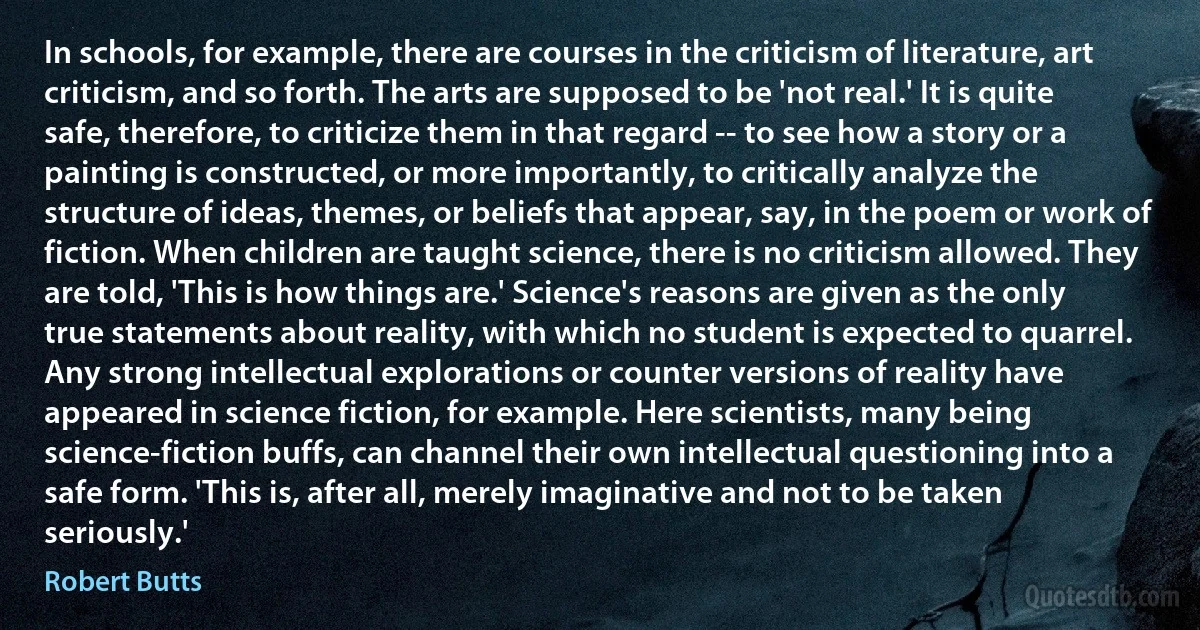
In schools, for example, there are courses in the criticism of literature, art criticism, and so forth. The arts are supposed to be 'not real.' It is quite safe, therefore, to criticize them in that regard -- to see how a story or a painting is constructed, or more importantly, to critically analyze the structure of ideas, themes, or beliefs that appear, say, in the poem or work of fiction. When children are taught science, there is no criticism allowed. They are told, 'This is how things are.' Science's reasons are given as the only true statements about reality, with which no student is expected to quarrel. Any strong intellectual explorations or counter versions of reality have appeared in science fiction, for example. Here scientists, many being science-fiction buffs, can channel their own intellectual questioning into a safe form. 'This is, after all, merely imaginative and not to be taken seriously.'
Robert ButtsRelated topics
appear art children criticism example form forth given intellectual quarrel quite real safe say science see story take teach tell work thingsRelated quotes
Critics of visual arts and of music describe in words - that is to say, a system of signs other than those made by brushes on canvas or chisels into stone or notes of music - those characteristics of painting or sculpture or music which can be described or analysed. Visual artists and composers can disregard critics on the ground that the medium of verbal criticism bears so indirect a relation to the medium in which they make something. Poets are in a different situation. With the development of so-called scientific methods of criticism they are made ever conscious that criticism of poetry is in the same medium of work as the art which they practise. "Close analysis” is useful to critics and readers. But for the poet there is the danger of disintegration of poetry into paraphrase, examination of technique, influences, all analysed in the language of criticism.

Stephen Spender
Taking again as an example the need to appear perfect, I would be interested primarily in understanding what this trend accomplishes for the individual (eliminating conflicts with others and making him feel superior to others), and also what consequences the trend has on his character and his life. The latter investigation would make it possible to understand, for example, how such a person anxiously conforms with expectations and standards to the extent of becoming a mere automaton, and yet subversively defies them; how this double play results in listlessness and inertia; how he is proud of his apparent independence, yet actually is entirely dependent on the expectations and opinions of others; how he is terrified lest anyone should discover the flimsiness of his moral strivings and the duplicity which has pervaded his life; how this in turn has made him seclusive and hypersensitive to criticism.

Karen Horney
Literary criticism should arise out of a debt of love. In a manner evident and yet mysterious, the poem or the drama or the novel seizes upon our imaginings. We are not the same when we put down the work as we were when we took it up. To borrow an image from another domain: he who has truly apprehended a painting by Cézanne will thereafter see an apple or a chair as he had not seen them before. Great works of art pass through us like storm-winds, flinging open the doors of perception, pressing upon the architecture of our beliefs with their transforming powers. We seek to record their impact, to put our shaken house in its new order. Through some primary instinct of communion we seek to convey to others the quality and force of our experience. We would persuade them to lay themselves open to it. In this attempt at persuasion originate the truest insights criticism can afford.

George Steiner
The proof of the pudding is in the eating. There was a widespread myth of the 1970s, a myth along Tom Kuhn's (1962) Structure of Scientific Revolutions lines. The Keynesianism, which worked so well in Camelot and brought forth a long epoch of price-level stability with good Q growth and nearly full employment, gave way to a new and quite different macro view after 1966. A new paradigm, monistic monetarism, so the tale narrates, gave a better fit. And therefore King Keynes lost self esteem and public esteem. The King is dead. Long live King Milton!
Contemplate the true facts. Examine 10 prominent best forecasting models 1950 to 1980: Wharton, Townsend–Greenspan, Michigan Model, St. Louis Reserve Bank, Citibank Economic Department under Walter Wriston's choice of Lief Olson, et cetera. ... M did matter as for almost everyone. But never did M alone matter systemically, as post-1950 Friedman monetarism professed.

Paul Samuelson
There is no doubt that Goya thought that one of the drugs chiefly responsible for the sleep of reason was the Church, and he had the lowest possible opinion of ecclesiastical institutions. However, this did not prevent him from painting religious pictures, completely sincerely because, like all Latin people, however little he believed in Christianity, he felt himself to be within the structure of the Catholic Church. One of his finest works was the decoration of a church near Madrid called S. Antonio de la Florida. He used the kind of device that would have appealed to Tiepolo. He painted a balcony round the drum of a cupola, and behind it he put a crowd of loiterers who are supposed to be watching the saint raise a man from the dead. Very few of them are interested in this unusual event. They are interested in each other or themselves, and show very well the curious tension between the individual and the collective, which is the essence of a crowd.

Kenneth Clark
